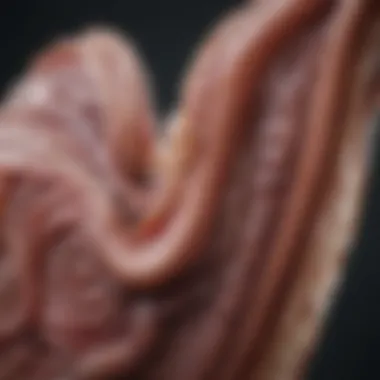Understanding Dog Diarrhea: Causes and Treatments


Intro
Dog diarrhea can be a troublesome issue for any pet owner. It’s one of those things that can signal a range of underlying health problems, from diet-related troubles to more serious diseases. Knowing what causes it, how to treat it, and how to maintain your dog’s digestive health is crucial for ensuring their wellbeing.
When a dog has diarrhea, the symptoms can vary widely. The consistency of the stool is the most obvious sign. But there may also be other accompanying signs like vomiting, lethargy, or changes in appetite. Observation in these moments can make a big difference. Keeping track of the symptoms helps your vet better identify the root cause.
Beyond simply dealing with the mess that comes with diarrhea, understanding the specific triggers is important. Sometimes it’s as minor as a sudden change in diet, while at other times, it could indicate a more serious concern such as infections or parasites.
This article will squeeze out the details on causes and treatments while also addressing how to care for your furry friend during these trying times. Let’s take a closer look at the various causes of diarrhea in dogs, remedial strategies, and how to keep their digestive track in tip-top shape.
Preface to Dog Diarrhea
In the realm of pet care, few issues can stir up as much concern and confusion as dog diarrhea. Understanding this common ailment is not just a matter of comfort for our furry friends; it's crucial for their overall health. Diarrhea can stem from various factors, each with its own implications and potential consequences. By grasping the nuances of canine diarrhea, pet owners can respond proactively, ensuring that their dogs receive appropriate care without unnecessary delays.
Defining what diarrhea means for dogs is the first step in this journey. It’s not merely about an increased frequency of bowel movements; it involves knowing what constitutes normal versus abnormal stool consistency. This understanding helps in assessing the severity of the situation. Moreover, recognizing the common symptoms associated with diarrhea serves as a preventive measure, enabling owners to monitor their pet's health regularly.
Why does it matter? Diarrhea might be a simple upset, but in some cases, it could indicate underlying conditions that require veterinary attention. Early detection of serious symptoms can be the line between a quick recovery and a more complicated health crisis.
A thoughtfully structured approach that combines general awareness with specific knowledge empowers pet owners. This involves asking questions, seeking information, and being vigilant. When the topic of dog diarrhea comes up, it’s essential to understand that it’s not just another pet issue; it’s a gateway into understanding the overall wellness of dogs.
"Ignorance may be bliss, but knowledge is the key to proactive pet care."
Arming oneself with knowledge about diarrhea can significantly improve both the pet's quality of life and the owner’s peace of mind. Armed with this information, we can confidently navigate the murky waters of canine health, making informed decisions that benefit our loyal companions.
Causes of Diarrhea in Dogs
Understanding the causes of diarrhea in dogs is essential for both pet owners and professionals in the veterinary field. Recognizing the underlying issues can make a significant difference in the speed and effectiveness of treatment. Diarrhea can stem from many diverse origins, each carrying its own set of implications for the dog’s health. Addressing these crucial causes not only aids in immediate care but also contributes to long-term wellbeing and prevention strategies.
Dietary Changes and Food Allergies
Diet plays a pivotal role in canine digestion. When a dog switches to a new food—whether it’s a different brand or a change in flavor—it can sometimes cause an upset stomach, leading to diarrhea. This reaction is particularly pronounced in dogs with sensitive stomachs. Additionally, food allergies are relatively common but often overlooked causes. Some dogs may develop intolerances to specific ingredients, such as wheat, corn, or even certain proteins like chicken or beef. Symptoms might not always appear right after they consume the problematic food, making it difficult to pinpoint the exact trigger.
Consider the following signs that may indicate food allergies:
- Itchy skin or hot spots
- Excessive scratching or licking
- Gastrointestinal upset like vomiting or diarrhea
If a food allergy is suspected, it’s vital to work with a veterinarian to establish an elimination diet that identifies the culprit ingredient.
Bacterial and Viral Infections
Infections caused by bacteria or viruses can ignite serious digestive troubles in dogs. Bacterial pathogens like Salmonella or E. coli often lurk in undercooked meats or contaminated water. These infections can vary widely in symptoms, often accompanied by a sharp increase in frequency of defecation. Viral infections such as Canine Parvovirus are particularly dangerous, especially for puppies and unvaccinated dogs. Parvovirus not only causes severe diarrhea but also leads to life-threatening dehydration and possible death if left untreated.
Here are a few warning signs of gastrointestinal infections to watch for:
- Persistent vomiting
- Lethargy and weakness
- Signs of dehydration
Parasites: A Hidden Threat
Parasites represent another significant factor that can lead to diarrhea in canines. Conditions like giardiasis, caused by a microscopic parasite Giardia, often manifest with symptoms that might be misattributed to other causes. Intestinal worms such as roundworms or hookworms are also common offenders. They can irritate the digestive tract and cause inflammation, disrupting normal intestinal function.
To effectively deal with parasitic infections, regular preventative treatments using veterinarian-recommended dewormers are key. Keep an eye out for indicators such as:
- Weight loss even with normal appetite
- Worms in stool or around the anus
- Pot-bellied appearance, especially in puppies
Underlying Health Conditions


Sometimes, diarrhea is not an isolated issue but a symptom of an underlying health condition. Disorders like pancreatitis, inflammatory bowel disease (IBD), or even systemic diseases such as kidney or liver ailments can lead to digestive disruptions. Monitoring your dog for additional indicators of ill health is vital, particularly if diarrhea persists. Symptoms to note may include:
- Changes in appetite
- Increased thirst
- Abdominal pain or discomfort
For instance, IBD can lead to ongoing digestive disturbances, requiring the attention of a veterinarian to develop an appropriate management plan.
Recognizing the various causes of dog diarrhea is crucial for effective treatment and long-term health maintenance. Proper insights can help pet owners and professionals alike navigate the complex landscape of canine health care.
Identifying the Severity of Diarrhea
Assessing the severity of diarrhea in dogs is a fundamental part of understanding their health and well-being. This section delves into why it’s vital for pet owners to recognize the differences between mild and severe diarrhea, which can inform not only home care strategies but also when it might be necessary to seek professional veterinary help. Knowing the signs and symptoms of each condition can ensure timely interventions, potentially saving your dog from more serious health complications.
Mild Diarrhea: When to Monitor
Mild diarrhea is commonly encountered and often doesn't raise immediate alarm bells. In many cases, it can be a passing issue without serious ramifications. However, vigilance is key. Monitoring your dog during this time becomes crucial.
Some indicators that you might be dealing with mild diarrhea include:
- Loose stool consistency, but not liquid
- The dog’s behavior remains relatively normal, eating and drinking as usual
- Occasional straining during bowel movements
- No presence of blood or unusual colors in the stool
When observing mild diarrhea, it’s wise to keep tabs on your dog’s overall condition. Watch for any changes in behavior that might indicate discomfort or distress. Hydration is crucial at this stage. Ensure your dog has access to fresh water, as diarrhea can lead to dehydration.
In essence, if the dog’s energy levels remain stable and they aren't showing any signs of it affecting their daily routine, it’s likely that all they need is a bit of observation at home. If things don’t improve within 24 to 48 hours, it’s time to consider further steps or even consulting your veterinarian.
Severe Diarrhea: Signs of Concern
Severe diarrhea is a whole different ball game. This condition is alarming and requires more than just a watchful eye. It often involves greater consequences that can quickly escalate into something serious. The key signs to look out for include:
- Frequent, watery stools that occur multiple times throughout the day
- Loss of appetite or unwillingness to drink
- Noticeable lethargy or a significant drop in energy
- Vomiting accompanying the diarrhea
- Presence of blood or black, tarry stools
- Signs of abdominal pain such as whining or hiding
Once severe diarrhea is recognized, immediate action is necessary. Dehydration can set in quickly, which can be especially dangerous for smaller breeds or young puppies. Getting your dog to a veterinary clinic should be a priority rather than waiting to see if they improve on their own.
"Recognizing urgent symptoms can be the line between a routine upset tummy and a critical health issue. Take these signs seriously."
Immediate Care for Canine Diarrhea
Immediate care is crucial when it comes to managing diarrhea in dogs. The first moments after noticing diarrhea can often dictate the dog's recovery process. Left unchecked, diarrhea can lead to dehydration and more serious health issues. In this section, we will delve into two key areas of immediate care: hydration and dietary adjustments.
Hydration: The First Step
Hydration plays a pivotal role in the immediate care of a dog experiencing diarrhea. Just like humans, dogs lose a significant amount of fluids and electrolytes when they have diarrhea. Hence, ensuring that your furry friend stays well-hydrated is a top priority.
Key Points of Hydration:
- Fluid Replacement: Dogs require fluid replacement to counteract the loss caused by diarrhea. Fresh water is usually sufficient, but oral rehydration solutions designed specifically for pets can also aid recovery.
- Signs of Dehydration: Look out for signs like excessive panting, dry gums, and lethargy. If your dog displays these symptoms, seeking veterinary help is essential.
Proper hydration sets the foundation for recovery and helps maintain your dog’s overall health during periods of distress.
Dietary Adjustments During Recovery
Once hydration is under control, dietary adjustments become the next crucial step. What you feed your dog can significantly impact its recovery process. It’s important to choose the right food that is gentle on the stomach and promotes healing.
Recommended bland diets
When facing diarrhea, recommended bland diets can be a beneficial choice. These diets are typically low in fat and easy to digest. The classic options include boiled chicken, rice, or plain pumpkin.
Key Characteristics of Bland Diets:


- Easily Digestible: The simplicity in ingredients helps dogs’ digestive systems recover without additional strain.
- Soothing Effect: Foods like plain pumpkin can help firm up stools owing to their fiber content. This aspect makes them a popular go-to during these sensitive times.
Working in conjunction with the hydration efforts, bland diets contribute positively, allowing the digestive tract to rest while gradually reintroducing solid foods.
Duration of dietary changes
The duration of dietary changes is an often overlooked aspect of recovery. Simply switching your dog to bland food is not enough; knowing how long to maintain this regime is essential for full recovery.
Key Characteristics:
- Gradual Transition: It’s vital to gradually transition back to their regular diet. Jumping back to heavy or rich food too quickly can retrigger digestive issues.
- Monitoring Progress: Keep an eye on your dog's stool consistency and overall behavior. If things seem to improve, you can begin mixing regular food into their bland diet after a few days.
In summary, immediate care for canine diarrhea hinges on adequate hydration and the right dietary modifications. These steps provide the necessary support for your dog during a critical time in their health journey. By being vigilant and responsive, you can help steer your beloved pet towards a swift recovery.
Veterinary Intervention: When Is It Necessary?
When it comes to managing dog diarrhea, knowing when to call in a vet can be the difference between a minor issue and a serious health crisis. Pet owners often feel overwhelmed by the myriad of symptoms and possible causes. Understanding what warrants veterinary intervention is critical, not just for immediate care but for long-term health considerations. The benefits of timely professional advice can lead to quicker recoveries and preventative measures that avoid future episodes of diarrhea.
Recognizing Urgent Symptoms
Persistent vomiting
Persistent vomiting in dogs is more than just an inconvenience; it's often a sign of underlying health issues. When a dog is vomiting repeatedly, it can lead to dehydration and electrolyte imbalances. The key characteristic of persistent vomiting is that it occurs more than a couple of times within hours, showing that your pet's digestive system is clearly distressed. This symptom is invaluable in this article as it underscores the necessity for prompt veterinary care. Noticing this urgent symptom can lead to early diagnosis, potentially preventing serious conditions like pancreatitis or gastrointestinal obstructions. The disadvantage here is that many pet owners may dismiss mild vomiting as a dietary upset, missing critical signs that require immediate attention.
Blood in stool
One of the most alarming signs a dog owner can encounter is blood in the stool. This symptom can indicate anything from a simple bout of colitis to severe conditions such as internal bleeding or cancer. The main feature that makes this symptom crucial is its ability to represent various serious health threats. In the context of this article, highlighting blood in stool is vital for promoting awareness among dog owners. The urgency stemming from this symptom can't be overstated, and the disadvantages may include hesitance to seek care due to fear or misunderstanding, potentially delaying treatment for serious underlying issues.
Extreme lethargy
Extreme lethargy in dogs is not merely a sign of a lazy day; it often represents a systemic issue. When a normally active dog becomes excessively tired or uninterested in its surroundings, it indicates that something is wrong. This symptom's key aspect is its widespread manifestation in various health issues, from infections to metabolic disorders. This article finds it advantageous to discuss extreme lethargy because recognizing this symptom prompts owners to act swiftly. However, while it can often lead to early veterinary interventions, one disadvantage may be the vagueness of lethargy itself, where owners might misattribute it to weather, mood, or other benign factors, thus delaying much-needed care.
Diagnostic Procedures
Diagnostic procedures are crucial components in determining the cause behind your dog's diarrhea and any accompanying symptoms. A vet often employs a range of methods including physical examinations, blood tests, and fecal analysis to piece together the bigger picture. The diagnostics will illuminate any infectious agents, nutritional deficiencies, or systemic issues impacting your pet's health. Questions the vet might ask include detailed inquiries about the dog's diet, lifestyle, and the specific symptoms observed. This comprehensive approach not only informs immediate treatment but also shapes long-term health strategies for maintaining a robust gastrointestinal tract.
In summary, recognizing urgent symptoms like persistent vomiting, blood in stool, and extreme lethargy should never be underestimated. Such vigilance could save your dog's life, enhancing its quality and longevity.
Long-Term Management of Diarrhea-Prone Dogs
Managing diarrhea in dogs is not merely about addressing it when it arises; it requires a proactive approach for dogs that are frequently affected. Long-term management is crucial for ensuring the well-being of our furry friends, as chronic diarrhea can lead to malnutrition, dehydration, and a general decline in quality of life. Dog owners must engage in continuous monitoring of their dog's health and adjust their care strategies accordingly.
Establishing a Suitable Diet
Finding the right diet is a game-changer for dogs that struggle with recurrent diarrhea. A tailored diet not only promotes healthy digestion but also helps prevent flare-ups.
Choosing high-quality pet food
Selecting high-quality pet food plays a significant role in addressing gastrointestinal issues. Premium dog foods often contain better ingredients that are easier for a dog's system to process. These foods are usually rich in digestible proteins and lacking fillers that can exacerbate digestive issues. One key characteristic of high-quality pet food is its ingredient transparency, detailing sources of protein and carbohydrates clearly. This is particularly beneficial because pet owners can ensure that their dogs aren’t ingesting ingredients to which they may be sensitive.
A unique feature of these diets is that they might include formulated blends of probiotics and prebiotics that support gut health. The advantage here is clear: a strong digestive system can significantly decrease the chance of diarrhea. However, the downside could be the price tag; such food can be more expensive than generic brands.
Possible supplements
Sometimes, dietary adjustments alone aren't enough. Supplements can play an important part in managing a dog's digestive health. For example, probiotics can introduce beneficial bacteria into the gut, which might assist in reducing diarrhea symptoms. The key characteristic here is that supplements are designed to target specific digestive imbalances, providing an additional layer of support.
One unique aspect of using supplements is their versatility; various types cater to different needs such as digestive enzymes to aid food breakdown or fiber sources to firm up stools. While they can be pretty effective, it's important to consult a vet to avoid any possible adverse reactions with the dog's existing diet or health issues.


Preventive Health Measures
It’s not all about treating diarrhea when it occurs; preventive measures matter just as much. Keeping a close watch on your dog’s general health can save you a lot of trouble in the long run.
Regular veterinary check-ups
Scheduling regular veterinary check-ups is a cornerstone of long-term management. These appointments allow for early detection of any underlying health issues that might contribute to diarrhea. Vets can offer tailored advice and adjustment options based on your dog's unique needs. The key characteristic of these check-ups is that they create a consistent monitoring system, thereby fostering an avenue for timely intervention when necessary.
One unique feature is that many veterinary clinics offer wellness plans that can break down routine care into manageable costs, improving accessibility. However, the downside is the time commitment and possibly some financial burden, but the long-term benefits often outweigh these inconveniences.
Routine deworming
Another preventive measure is routine deworming. Parasites are culprits that can lead to various digestive issues, including diarrhea. Regular deworming keeps potential threats at bay and contributes significantly to your dog's overall health. The key characteristic of this measure is its effectiveness in proactively preventing infection, which is much easier than dealing with a full-blown infestation.
One unique aspect of this practice is that it often correlates with seasonal/environmental factors, meaning that the frequency may vary depending on the dog's lifestyle. However, pet owners must be aware that routine deworming requires veterinary guidance, as over-deworming can also have adverse effects.
In summary, the long-term management of diarrhea-prone dogs involves consistent dietary adjustments, regular veterinary visits, and preventive health measures like routine deworming. This comprehensive approach not only improves your dog's quality of life but can also lead to a more fulfilling companionship.
Common Misconceptions About Dog Diarrhea
Understanding dog diarrhea requires a clear focus on misconceptions that many pet owners may have. These misunderstandings can lead to inappropriate management and unnecessary distress for both the pet and the owner. Recognizing myths around dog diarrhea can help ensure that dogs receive proper care and that owners are well-informed about the condition. When myths persist, they create barriers to effective treatment, and can complicate a straightforward issue.
Fasting as a Treatment
Fasting is often touted as a way to allow a dog's digestive system to reset itself. However, this can be a double-edged sword. On one hand, it might provide the intestines time to recover, particularly when paired with a bland diet afterward. On the other hand, fasting can also lead to further complications, especially in young or elderly dogs. Young puppies, for instance, require regular intake of nutrients for growth.
- Potential Risks of Fasting:
- Nutritional deficiencies
- Weakening of the immune system
- Increased dehydration levels
Instead, it might be more beneficial to offer small amounts of water and introduce a bland diet instead of going completely dry. It's a bit like waiting to tame a raging fire; soaking it with water is often smarter than letting it burn out completely!
Over-the-Counter Human Medications
Using over-the-counter human medications is another common misconception that can lead to complications. Just because something is effective for humans doesn’t mean it’s safe for dogs. For example, medications like ibuprofen and acetaminophen are well-known to be toxic to canines. Other medications might not address the root cause of diarrhea or could even exacerbate the situation.
- Common Human Medications Misunderstanding:
- Pepto-Bismol: While some owners might consider this safe, it can mask symptoms and lead to possible reactions.
- Loperamide (Imodium): Some vets may allow its use under certain conditions, but it could be dangerous if the diarrhea is caused by certain types of infections.
Important Note: Always consult a veterinarian before administering any medication, even those that seem harmless.
It’s essential for pet owners to rely on veterinary guidance when it comes to treatment options instead of turning to remedies that lack sufficient research on their safety for dogs. By understanding these misconceptions and seeking proper advice, pet owners can navigate the pressures surrounding dog diarrhea more effectively.
Culmination: Maintaining Digestive Health in Dogs
In the realm of canine care, maintaining digestive health stands as a cornerstone for overall well-being. This conclusion synthesizes essential insights from the previous sections of this article, emphasizing how vital a sound digestive system is for dogs. Solid digestion doesn’t just mean fewer visits to the vet; it also equates to better energy levels, enhanced mood, and even a gleaming coat.
First and foremost, a balanced diet tailored to the needs of the individual dog is crucial. Many owners overlook the importance of high-quality pet food. The benefits of selecting premium brands, which include better protein sources and fewer fillers, cannot be overstated. Many dogs thrive on diets rich in fiber as well, which helps regulate their gut and support digestion.
Additionally, preventive health measures play a significant role. Regular veterinary check-ups ensure that health issues are caught early. These visits provide a chance to discuss dietary habits, physical fitness, and any noticeable changes in behavior. Routine procedures like deworming can prevent parasites - a hidden hazard that easily disrupts digestive health.
Another consideration involves the critical aspect of hydration. Dogs suffering from diarrhea are at risk of dehydration, which can spiral into more serious health concerns if left unchecked. Encouraging water intake can be life-saving, especially during episodes of digestive upset.
It’s equally important to recognize the common misconceptions about dog diarrhea. As highlighted in this article, fasting is often mistakenly seen as a cure-all, while human medications can cause more harm than good. Educating oneself about these myths can lead to more effective decision-making when it comes to your dog’s health.
"An ounce of prevention is worth a pound of cure." – This holds true for maintaining digestive health in our pets.
Finally, ongoing education and openness to adapting care based on the latest research contributes to a deeper understanding of canine health. Being proactive rather than reactive with respect to dog diarrhea can lead to a more enjoyable life for both the canine and the owner.
Summarizing Key Points
- Balanced Diet: Choose high-quality foods tailored to your dog's specific needs.
- Preventive Care: Regular vet check-ups and deworming are essential.
- Hydration: Always ensure your dog has access to fresh water, especially during digestive issues.
- Understanding Myths: Dispelling common misconceptions can lead to healthier choices.
- Education: Stay updated on best practices for canine care to prevent issues before they arise.







